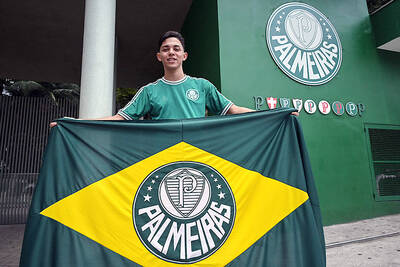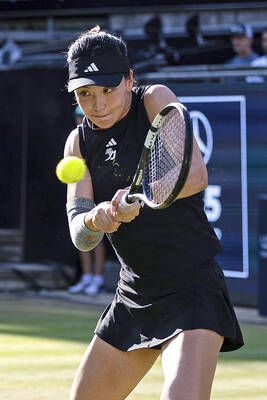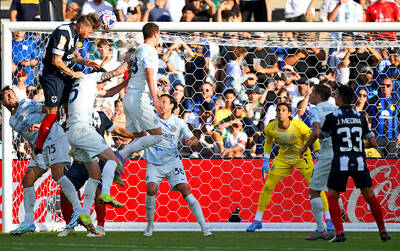Australia have taken 32 tortuous years to earn a second crack at the World Cup, but return to Germany with higher hopes than their part-time trailblazers back in 1974.
Then the anonymous immigrant-dominated team had to take holidays from their jobs to get to Germany. The 2006 home-grown Socceroos come predominantly from European clubs with many of their players well known to the soccer world.
The Australians didn't score a goal in their last World Cup sojourn, going down 2-0 to East Germany, 3-0 to eventual champions West Germany and drawing 0-0 with Chile.

PHOTO: AP
But refashioned under the shrewd guidance of Dutchman Guus Hiddink, the Australians believe they are not just making up the numbers in Germany, but can make it through to the second round from Group F, headed by champions Brazil, and including 1998 semi-finalists Croatia and Japan.
Alaves striker John Aloisi's successful penalty in the 4-2 shoot-out play-off win over two-time winners Uruguay last November has the Socceroos believing more can be achieved under miracle worker Hiddink at soccer's biggest event.
Hiddink achieved World Cup qualification with the Socceroos just under four months after replacing Australian Frank Farina, sacked after Australia leaked 10 goals at the Confederations Cup in Germany last June.
Hiddink, who has taken Netherlands and South Korea to the semi-finals of the last two World Cups, is off to Russia after next month's finals and is looking to make another impact on world soccer's elite with the unfashionable Australians.
But all this optimism follows decades of despair as Australia suffered continual setbacks and heartbreak in their bid to reach the pinnacle tournamnet of world soccer.
Seven failed campaigns followed their 1974 World Cup debut, among them to Argentina (2-1 on aggregate in 1993), Iran (on away goals in 1997) and Uruguay (4-1 on aggregate in 2001).
Soccer domestically struggled for credibility after decades of ethnic rivalries and bureaucratic vendettas that had left the sport languishing. But under Australia's richest man, Frank Lowy, and former Australian Rugby Union chief executive John O'Neill, Australian soccer was reformed and now has a new A-League and integration with the Asian Football Confederation which offers direct World Cup places and tougher opposition than Oceania.
The talk here is about what the Australians might actually achieve in Germany.
The prevailing mood is typified by skipper and Middlesbrough striker Mark Viduka.
"I think we can do something over there. We're not going just to make up the numbers. We can go there and play some good football," he said.
"It's just that hurdle of finally making the World Cup finals that we had to get over and we've done that," Viduka said.
Everton midfielder Tim Cahill, who is racing to recover from a knee injury to be fit for Germany, said: "This is the biggest moment we'll ever have as footballers on the world stage."
"This is the first chance we get to express ourselves and to show the world what we're made of. We've got a lot of players who play in the English Premier League and all over the world who are performing well," Cahil added.
Hiddink has developed a strong, technically-sound five-man midfield of Parma's Vince Grella and Marco Bresciano, PSV Eindhoven's Jason Culina, Blackburn Rovers' Brett Emerton and Cahill.
Viduka leads the line with support from Liverpool's Harry Kewell, Aloisi and Archie Thompson.
Defence is one of Australia's frailties, although Blackburn's Lucas Neill, and Tony Popovic of Crstal Palace restricted the Urguayans to just one goal in three and a half hours of soccer in the World Cup playoffs.
Former skipper and central defender Craig Moore of Newcastle United is expected to return from injury.
Middlesbrough's Mark Schwarzer, who became a national sports hero for his two penalty saves in the shoot-out against Uruguay, is the first-choice goalkeeper ahead of Zeljko Kalac of AC Milan.

Brazil has four teams, more than any other country, in the expanded Club World Cup that kicked off yesterday in the US, but for SE Palmeiras, the competition holds a special meaning: winning it would provide some redemption. Under coach Abel Ferreira since 2020, Palmeiras lifted two Copa Libertadores titles, plus Brazilian league, cup and state championships. Even before Ferreira, it boasted another South American crown and 11 league titles. The only major trophy missing is a world champions’ title. Other Brazilian clubs like Fluminense FC and Botafogo FR, also in the tournament, have never won it either, but the problem for Palmeiras

Lionel Messi drew vast crowds and showed flashes of his brilliance when his Inter Miami side were held to a goalless draw by African giants Al-Ahly as the revamped FIFA Club World Cup got off to a festive start on Saturday. Fans showed up en masse for the Group A clash at the Hard Rock Stadium, home to the NFL’s Miami Dolphins, but Messi could not fully deliver, his best chance coming through a last-second attempt that was deflected onto the crossbar. Inter Miami next face FC Porto on Thursday in Atlanta, while Al-Ahly, who benefited from raucous, massive support, are to

Twelve days after winning her second Grand Slam title at the French Open, Coco Gauff fell at the first hurdle on grass in Berlin on Thursday as beaten Paris finalist Aryna Sabalenka advanced to the quarter-finals. Recipient of a first round bye, American Gauff lost 6-3, 6-3 to Chinese qualifier Wang Xinyu as world number one Sabalenka beat Rebeka Masarova 6-2, 7-6 (8/6) in her second round tie. Winner of 10 main tour titles, including the US Open in 2023 and the WTA Finals last year, Gauff has yet to lift a trophy in a grass-court tournament. “After I won the first

Sergio Ramos on Tuesday outfoxed two Inter players and artfully headed home the first goal for Monterrey at the FIFA Club World Cup. The 39-year-old Ramos slipped through the penalty area for the score just as he did for so many years in the shirts of Real Madrid and Spain’s national team, with whom he combined smarts, timing and physicality. Ramos’ clever goal and his overall defensive play at the Rose Bowl were major factors in Monterrey’s impressive 1-1 draw against the UEFA Champions League finalists in the clubs’ first match of the tournament. “There is always a joy to contribute to the